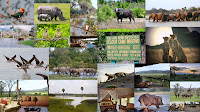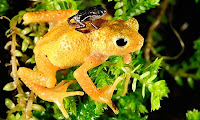Safari Notes: Selous Game Reserve, Tanzania

Spectacular Selous Game Reserve As a child, I and my family spent some years in Iringa, Tanzania and areas around it - Iringa is a town with beautiful surroundings and an excellent climate. Not far - South East of Iringa, is one of the most breathtaking, wonderful and pristine wilderness and game reserves in the world: the Selous Game Reserve. Selous ( pronounced Seloo , is named after Englishman, Frederick Courtney Selous - conservationist, hunter, explorer and author) is the largest g ame reserve in Tanzania and due to its uniqueness, it is a UNESCO World Heritage Site. The reserve is approximately 55,000 square kilometers - about 21,236 square miles (that is four times the size of the Serengeti, more than three times the size of Swaziland and more than twice the size of Rwanda; almost five times the size of Qatar; larger than Costa Rica or Netherlands or Denmark or Bhutan or Switzerland; and more than twice the sizes of Massachusetts or Vermont or New Hamps...


